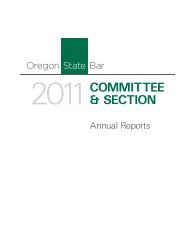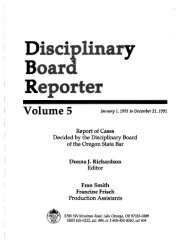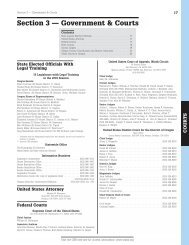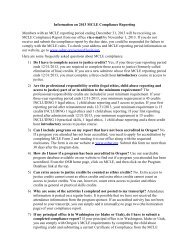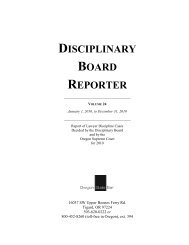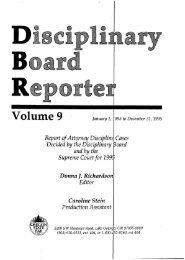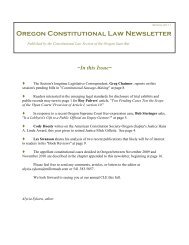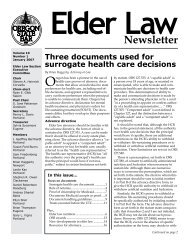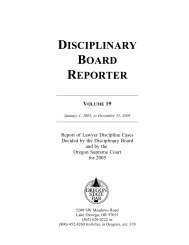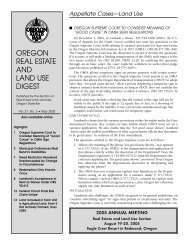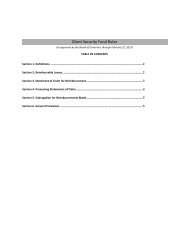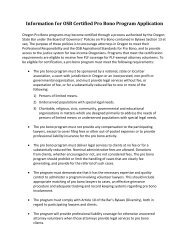February 22, 2013 - Oregon State Bar
February 22, 2013 - Oregon State Bar
February 22, 2013 - Oregon State Bar
You also want an ePaper? Increase the reach of your titles
YUMPU automatically turns print PDFs into web optimized ePapers that Google loves.
the holder of the account asks for additional information to identify Lawyer, or if Lawyer<br />
has some other reason to believe that the person misunderstands her role, Lawyer<br />
must provide the additional information or withdraw the request.<br />
If Lawyer has actual knowledge that the holder of the account is represented by<br />
counsel on the subject of the matter, RPC 4.2 prohibits Lawyer from making the<br />
request except through the person’s counsel or with the counsel’s prior consent. 7 See<br />
OSB Formal Ethics Op No. 2005-80 (discussing the extent to which certain employees<br />
of organizations are deemed represented for purposes of RPC 4.2).<br />
3. Lawyer may not advise or supervise the use of deception in<br />
obtaining access to non-public information unless ORCP 8.4(b)<br />
applies.<br />
<strong>Oregon</strong> RPC 8.4(a)(3) prohibits a lawyer from engaging in “conduct involving<br />
dishonesty, fraud, deceit or misrepresentation that reflects adversely on the lawyer’s<br />
fitness to practice law.” 8 See also RPC 4.1(a) (prohibiting a lawyer from knowingly<br />
making a false statement of material fact to a third person in the course of representing<br />
a client). Accordingly, Lawyer may not engage in subterfuge designed to shield<br />
Lawyer’s identity from the person when making the request. 9<br />
As an exception to RPC 8.4(a)(3), RPC 8.4(b) allows a lawyer to advise clients and<br />
others about or supervise, “lawful covert activity in the investigation of violations of<br />
civil or criminal law or constitutional rights, provided the lawyer’s conduct is otherwise<br />
in compliance with these Rules of Professional Conduct.” For purposes of the rule<br />
“covert activity” means:<br />
[A]n effort to obtain information on unlawful activity through the use of<br />
misrepresentations or other subterfuge. ‘Covert activity’ may be<br />
commenced by a lawyer or involve a lawyer as an advisor or<br />
supervisor only when the lawyer in good faith believes there is a<br />
reasonable possibility that unlawful activity has taken place, is taking<br />
place or will take place in the foreseeable future.<br />
In the limited instances allowed by the RPC 8.4(b) (more fully explicated in OSB<br />
Formal Ethics Op No 2005-173), Lawyer may advise or supervise another’s<br />
deception to access a person’s non-public information on a social media website.<br />
7 In re Newell, 348, Or. 396, 413, 234 P.3d 967 (2010), (reprimanding lawyer who communicated on<br />
"subject" of the representation).<br />
8 See In re Carpenter, 337 Or. <strong>22</strong>6, 95 P3d 203 (2004) (lawyer received public reprimand after<br />
assuming false identity on social media website).<br />
9 See <strong>Oregon</strong> RPC 8.4(a) which prohibits a lawyer from violating the RPCs, from assisting or inducing<br />
another to do so, or from violating the RPCs “through the acts of another”).



